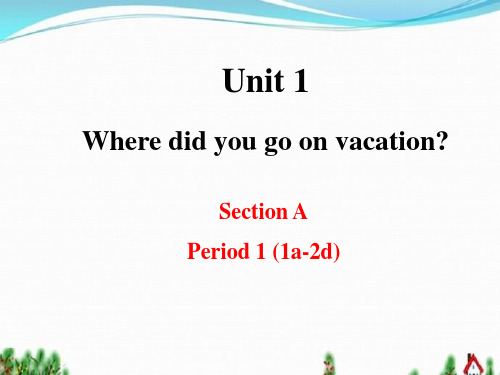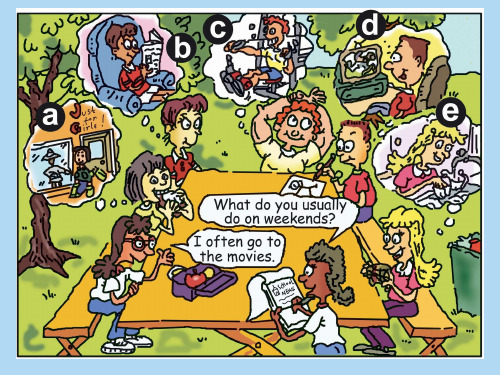人教版八年级英语上册课件全套(上)
合集下载
人教版八年级上册英语全册课件-八上英语课件

do anything
✔
Julie interesting?
study for tests? ✔
go out with anyone?
✔
Talk about your vacation plans with your friends and fill in the chart.
Name Vacation plans Who? When?
Where did you go on vacation?I went to
the
2mountai 1 ns.
4
53
1. Tina 2. Xiang Hua
3. Sally
4. Bob
5. Tom
1c
A: What did Tina go on vacation? B: She went to the mountains.
stayed at home
Where did you go on vacation?
went to New York City
Where did you go on vacation?
went to the beach
Where did you go on vacation?
visited my uncle
People
Places
Grace New York City (Central Park) Kevin the beach Julie stayed at home
2b Listen again. Check (✔) Yes, I did or No, I didn’t for each question.
anyone 任何人 each 每个
人教版八年级英语上册-全册PPT课件全集(149张)

26) more than 多于
课文要点
1、What do you usually do on weekends?
on weekens 表示“在周末”,泛指每个周末; on the weekend表示“在周末,在这个周 末”,特指某个周末。
2、help with housework
help sb. with sth. = help sb. (to) do sth
初二英语上册
Unit 1: Where did you go on vacation?
New Words.
anyone wonderful something seem someone try different umbrella hungry dislike anywhere most everyone bored dicide wonder wait enough
修饰不可数名词,意为 “太多”,还可修饰动词 做状语
修饰形容词或副词,意为 “太”
She bought too many eggs. We have too much work to do.
You are walking much too fast.
too much, much too,用法区别看后头,much后接不可数, too后修饰形或副。Too many 要记住,后面名词必复数。
1)单数名词词尾加’s, 复数名词词尾没有s, 也要加 ’s the girl’s pen Children’s Day
2)复数名词以s结尾的只加 ’ the students’ reading room
3)如果两个名词并列,并且分别有 ’s, 则表示“分别有”; 只 有一个名词有一个’s, 则表示“共有”;
2020秋人教版英语八年级上册全册单元全套优质课件

activities, to enjoy life.
➢ Warming-up
We went on a vacation, vacation, vacation.
We went on a vacation. And what do you think we saw?
On vacation
And what do you think we saw?
1. Tina 2. Xiang Hua 3. Sally 4. Bob 5. Tom
21
53 4
1c Make conversations about the people in the picture.
A: Where did Tina go on vacation? B: She went to the mountains.
our beautiful life.
➢ Words review
anyone few quite a few most
pron. 任何人 adj. & pron. 不多;很少 相当多;不少 adj., adv. & pron. 最多;大多数
ne nywhere
nderful
Quick eye
quite most
2.Master the words in this unit and preview next part.
Section A 2a-2d
➢ Objectives
To learn the past simple tense.
To learn to talk about past events. To enjoy the beautiful scenery,to enjoy
➢ Warming-up
We went on a vacation, vacation, vacation.
We went on a vacation. And what do you think we saw?
On vacation
And what do you think we saw?
1. Tina 2. Xiang Hua 3. Sally 4. Bob 5. Tom
21
53 4
1c Make conversations about the people in the picture.
A: Where did Tina go on vacation? B: She went to the mountains.
our beautiful life.
➢ Words review
anyone few quite a few most
pron. 任何人 adj. & pron. 不多;很少 相当多;不少 adj., adv. & pron. 最多;大多数
ne nywhere
nderful
Quick eye
quite most
2.Master the words in this unit and preview next part.
Section A 2a-2d
➢ Objectives
To learn the past simple tense.
To learn to talk about past events. To enjoy the beautiful scenery,to enjoy
人教版八年级上册英语Unit1 Where did you go on vacation课件(35张ppt)

•Language structures:
Where did you go on vacation? I went to New York City. Did you go out with anyone? No. No one was here. Everyone was on vacation. Did you buy anything special? No, I bought nothing. How was the food? Everything tasted really good!
Linda: Did you go shopping?
Alice: Of course! I bought ______ for my parents, but _______ for myself.
Linda: Why didn’t you buy _______ for yourself?
Alice: I didn’t really see _______ I like.
Pairworks:
1. How was your vacation?
It was pretty good.
2. What did ...?
I went ...
3. How was ....?
It was fantastic.
4. How were ...?
They were friendly.
在这里可以让学生用他们所会的词语回答.
They
My parents.
Task 1 Talk about your vacation activities.
went to the mountain went to the summer camp
八年级上册英语全册课件(人教版)

Claire: Twice a week, on Wednesday and Friday. Jack: Well, how about Tuesday? Claire: Oh, I have to play tennis with my friends.
But do you want to come? Jack: Sure.
Where did you go on vacation?
went to New York City
Where did you go on vacation?
went to the beach
Where did you go on vacation?
visited my uncle
Where did you go on vacation?
全北美京著新名A世的M纪C电电影影院院线 I often go to the movies.
I often play football.
What do you usually do on weekends? I often do some reading. I often watch TV.
What do you usually do on weekends?
2a Listen. Cheng Tao is talking about how often he does these activities. Number the activities you hear <1-5>.
3
5 4 2
2b Listen again. Match the activities in 2a with how often Cheng Tao does them.
2021年秋人教版八年级上册英语全册教学课件

He visited his grandparents.
1a Match the activities with the pictures [a-g].
1. stayed at home __f___ 2. went to New York City _b__ 3. visited my uncle _g__
➢ Warming-up
We went on a vacation, vacation, vacation.
We went on a vacation. And what do you think we saw?
On vacation
And what do you think we saw?
And what do you think we saw?
go to the mountains stay at home
go to the beach
go to summer camp
go hiking
Where did you go on vacation? Who did you go with? Did you have a good time?
Where did Bob go on vacation?
He visited his uncle.
Where did Tom go on vacation? He went to summer camp.
Where did Sally go on vacation? She stayed at home.
Other people on vacation.
People on vacation.
People on vacation.
That’s the only thing we saw.
1a Match the activities with the pictures [a-g].
1. stayed at home __f___ 2. went to New York City _b__ 3. visited my uncle _g__
➢ Warming-up
We went on a vacation, vacation, vacation.
We went on a vacation. And what do you think we saw?
On vacation
And what do you think we saw?
And what do you think we saw?
go to the mountains stay at home
go to the beach
go to summer camp
go hiking
Where did you go on vacation? Who did you go with? Did you have a good time?
Where did Bob go on vacation?
He visited his uncle.
Where did Tom go on vacation? He went to summer camp.
Where did Sally go on vacation? She stayed at home.
Other people on vacation.
People on vacation.
People on vacation.
That’s the only thing we saw.
最新新人教版八年级上册英语-unit1-SectionAPPT课件

People places
Grace Kevin Julie
New York City The beach home
2b Listen again. Check (√) Yes, I did or No, I didn’t for each question.
Did you…
Yes, I did. No, I didn’t.
Rick: Not really. I just stayed at home most of the time to read and relax.
5. I was on vacation last month. be on vacation 译为 “在度假” 强调状态。 而 “go to vacation”, 去度假。 强调动作。 我们应该如何区分英语中强调动作和状态 的词语: 1)一般来说,单独的动词/短语一般强调动作 ;而如果“be + 分词/形容词”则只表状态。 如marry sb和get married to sb表动作,而be married to sb表状态。
Where did Bob go on vacation? g
He visited his uncle.
Where did Tom go on vacation?
d He went to summer camp.
Where did Sally go on vacation?
f
She stayed at home.
Language Points
1. --Where did you go on vacation? 你去哪儿度假了?
--I went to the mountains. 我去了山区。 1) 这是一个特殊疑问句。由“特殊疑问词
人教版八年级上英语 unit 1单元课件全套

but we didn’t get any fish.
Conversation 3 Boy: Did you go anywhere on vacation, Tom? Tom: I _w__e_n_t_t_o_s_u_m__m_e_r__c_a_m_p__. Boy: Did you go with anyone?
Girl: What did you do on vacation, Sally? Sally: Nothing. I just _s_t_a_y_e_d_a_t__h_o_m_e__. Girl: And did you do anything interesting, Bob? Bob: Yes. I _v_i_si_t_ed__m__y_u_n_c_l_e_. We went fishing,
状元成才路 状元成才路
visited museums
状元成才路 状元成才路
went hiking
stayed at home
状元成才路 状元成summe状r元成才路camp
状元成才路
went to New York City
Vacation activities
went fishing
went camping
状元成才路 状元成才路
状元成才路
played computer
状元成才路
went to the park
went to the
beach
Language Goal:
Talk about past events
—Where did you go on vacation?
Conversation 1
Xiang Hua: Hey, Tina. Where did you _g_o_o_n__v_a_c_a_ti_o_n_? Tina: I _w_e_n_t__to__th__e_m__o_u_n_ta_i_n_s_ with my family.
Conversation 3 Boy: Did you go anywhere on vacation, Tom? Tom: I _w__e_n_t_t_o_s_u_m__m_e_r__c_a_m_p__. Boy: Did you go with anyone?
Girl: What did you do on vacation, Sally? Sally: Nothing. I just _s_t_a_y_e_d_a_t__h_o_m_e__. Girl: And did you do anything interesting, Bob? Bob: Yes. I _v_i_si_t_ed__m__y_u_n_c_l_e_. We went fishing,
状元成才路 状元成才路
visited museums
状元成才路 状元成才路
went hiking
stayed at home
状元成才路 状元成summe状r元成才路camp
状元成才路
went to New York City
Vacation activities
went fishing
went camping
状元成才路 状元成才路
状元成才路
played computer
状元成才路
went to the park
went to the
beach
Language Goal:
Talk about past events
—Where did you go on vacation?
Conversation 1
Xiang Hua: Hey, Tina. Where did you _g_o_o_n__v_a_c_a_ti_o_n_? Tina: I _w_e_n_t__to__th__e_m__o_u_n_ta_i_n_s_ with my family.
2021年秋人教版八年级上册英语全册教学课件

e.g. stay in the office 继续任职 (掌权) stay awake 不睡 (醒着) stay in the army 留在部队中 stay at home 呆在家中
► We’re staying in the same hotel. 我们住在同一家旅馆。
2) home与house, family的区别 home指“家”这个概念,包括“住处”和“家人”。 house则指“房子”、“住宅”,侧重于建筑结构。 family则指“家庭成员”。 当family作整体概念时,谓语动词用单数; 看作一个个成员时,谓语动词用复数。
2.Master the words in this unit and preview next part.
Thank you for listening
Section A 2a-2d
➢ Objectives
To learn the past simple tense.
To learn to talk about past events. To enjoy ห้องสมุดไป่ตู้he beautiful scenery,to enjoy
go on vacation?
stayed at home
Other people on vacation.
People on vacation.
People on vacation.
That’s the only thing we saw.
go sightseeing visit museums
go fishing
Vacation Activities
► We paid a visit to our teacher yesterday. 我们昨天去拜访了我们的老师。
人教版八年级上册英语Unit-1-5-全部词汇详解课件(137页)全文

◆ Someone is waiting for you at the door. ◆ What delicious chicken! I can’t wait to
taste it.
prep. & adv. 在……下面; 到……下面
反义词: above,意为“超过;在……上面”。 例句: ◆ From the top of the building, I could
短语:twice a week 一周两次 think twice 再三考虑
例句: ◆ I go to the movies twice a week. ◆ The ruler is twice as long as that one.
拓展: “一次”用once,“两次”用twice, “三次及以上”用“基数词+times” 如:twice a day, four times a year
dislikes.
Unit 2 How often do you exercise?
Section A
n.家务劳动; 家务事
构成: house(n. 房子)+ work( n. 工作) 短语:do (the) housework 做家务 例句:
◆ He is too lazy so he hardly does housework.
拓展:enjoyable 的相关词 enjoy: v. 享受;喜爱 enjoyment: activities 例句: The park is a popular place
for relaxing activities.
v. 决定;选定
句型: decide (not) to do sth. 决定(不)做某事 decide+“疑问词+动词不定式” decide+宾语从句 decide on sth. 就某事做决定;选定某事 例句:
taste it.
prep. & adv. 在……下面; 到……下面
反义词: above,意为“超过;在……上面”。 例句: ◆ From the top of the building, I could
短语:twice a week 一周两次 think twice 再三考虑
例句: ◆ I go to the movies twice a week. ◆ The ruler is twice as long as that one.
拓展: “一次”用once,“两次”用twice, “三次及以上”用“基数词+times” 如:twice a day, four times a year
dislikes.
Unit 2 How often do you exercise?
Section A
n.家务劳动; 家务事
构成: house(n. 房子)+ work( n. 工作) 短语:do (the) housework 做家务 例句:
◆ He is too lazy so he hardly does housework.
拓展:enjoyable 的相关词 enjoy: v. 享受;喜爱 enjoyment: activities 例句: The park is a popular place
for relaxing activities.
v. 决定;选定
句型: decide (not) to do sth. 决定(不)做某事 decide+“疑问词+动词不定式” decide+宾语从句 decide on sth. 就某事做决定;选定某事 例句:
人教版八年级英语上册ppt课件

经营者提供商品或者服务有欺诈行为 的,应 当按照 消费者 的要求 增加赔 偿其受 到的损 失,增 加赔偿 的金额 为消费 者购买 商品的 价款或 接受服 务的费 用
经营者提供商品或者服务有欺诈行为 的,应 当按照 消费者 的要求 增加赔 偿其受 到的损 失,增 加赔偿 的金额 为消费 者购买 商品的 价款或 接受服 务的费 用
3b Use the words given to write questions. Then ask
and answer them with a partner.
经营者提供商品或者服务有欺诈行为 的,应 当按照 消费者 的要求 增加赔 偿其受 到的损 失,增 加赔偿 的金额 为消费 者购买 商品的 价款或 接受服 务的费 用
chart and then make conversations.
经营者提供商品或者服务有欺诈行为 的,应 当按照 消费者 的要求 增加赔 偿其受 到的损 失,增 加赔偿 的金额 为消费 者购买 商品的 价款或 接受服 务的费 用
2d Role-play the conversation.
Jack: Hi, Claire, are you free next week? Claire: Hmm ... next week is quite full for me, Jack. Jack: Really? How come? Claire: I have dance and piano lessons. Jack: What kind of dance are you learning? Claire: Oh, swing dance. It’s fun! I have class once a week,
l.
Wow!
- 1、下载文档前请自行甄别文档内容的完整性,平台不提供额外的编辑、内容补充、找答案等附加服务。
- 2、"仅部分预览"的文档,不可在线预览部分如存在完整性等问题,可反馈申请退款(可完整预览的文档不适用该条件!)。
- 3、如文档侵犯您的权益,请联系客服反馈,我们会尽快为您处理(人工客服工作时间:9:00-18:30)。
I went to the Great Wall.
Where did he go on vacation?
He went to summer camp. /kæmp/
露营地, 阵营
Where did you go on vacation?
I went to Beijing City.
Where did they go on vacation?
人教版八年级英语上册
人教版八年级英语上册课件全套 (Unit 1-5)
Unit 1
Where did you go on vacation?
Section A 1a-1c
➢ Objectives
To learn the past simple tense.
To learn to talk about past events. To learn to enjoy different kinds of
They went to the mountains.
Where did they go on vacation?
They went to the beach.
Where did she go on vacation?
She stayed at home.
Where did he go on vacation?
动词原形 go stay visit do is have
Language Points
1. — Where did you go on vacation? 你去哪儿度假了?
— I went to the mountains. 我去了山区。
这是一个特殊疑问句。由“特殊疑问词+助动词+主语 +动词原形+其他?” 构成。
go fishing
Vacation Activities
go to the mountains stay at home
go to the beach
go to summer camp
go hiking
Where did you go on vacation? Who did you go with? Did you have a good time?
b 1. Tina
2. Xiang Hua
3. Sally 4. Bob 5. Tom
21
53 4
1 Make conversations about the people in the
c picture. A: Where did Tina go on vacation? B: She went to the mountains.
activities, to enjoy life.
➢ Warming-up
We went on a vacation, vacation, vacation.
We went on a vacation. And what do you think we saw?
On vacation
And what do you think we saw?
4. went to summer camp __d__ 5. went to the mountains __c_ 6. went to the beach __a__ 7. visited museums _e__
1 Listen and number the people in the picture [1-5].
Where did she go on vacation?
She visited the USA. She went to New York City.
Where did they go on vacation?
They went to the museum.
➢ Group work
Where did you go on vacation?
由于是询问已发生的动作(过去的事情),所以助动词用 过去式did,其后的动词用原形。
► —Where did you go yesterday? 你昨天去了哪儿?
— I visited my friends. 我去拜访了朋友。
2. I stayed at home. 我待在家里。 1)stay可以作及物动词,也可以作不及物动词。 当它作不及物动词时就不能直接接宾语,其后接 相应的介词短语,表地点 或表状态。
Where did Xiang Hua go on vacation?
She went to New York City.
Where did he go on vacation?
He went to the beach.
动词过去式 went stayed visited did was had
Where did Bob go on vacation?
He visited his uncle.
Where did Tom go on vacation?
He went to summer camp.
Where did Sally go on vacation?
She stayed at home.
And what do you think we saw?
Other people on vacation.
People on vacation.
People on vacation.
That’s the only thing we saw.e visited his grandparents.
1a Match the activities with the pictures [a-g].
1. stayed at home __f___ 2. went to New York City _b__ 3. visited my uncle _g__
e.g. stay in the office 继续任职 (掌权) stay awake 不睡 (醒着) stay in the army 留在部队中 stay at home 呆在家中
► We’re staying in the same hotel.
2) home与house, family的区别 home指“家”这个概念,包括“住处”和“家人 house则指“房子”、“住宅”,侧重于建筑结构 family则指“家庭成员”。 当family作整体概念时,谓语动词用单数;
Where did he go on vacation?
He went to summer camp. /kæmp/
露营地, 阵营
Where did you go on vacation?
I went to Beijing City.
Where did they go on vacation?
人教版八年级英语上册
人教版八年级英语上册课件全套 (Unit 1-5)
Unit 1
Where did you go on vacation?
Section A 1a-1c
➢ Objectives
To learn the past simple tense.
To learn to talk about past events. To learn to enjoy different kinds of
They went to the mountains.
Where did they go on vacation?
They went to the beach.
Where did she go on vacation?
She stayed at home.
Where did he go on vacation?
动词原形 go stay visit do is have
Language Points
1. — Where did you go on vacation? 你去哪儿度假了?
— I went to the mountains. 我去了山区。
这是一个特殊疑问句。由“特殊疑问词+助动词+主语 +动词原形+其他?” 构成。
go fishing
Vacation Activities
go to the mountains stay at home
go to the beach
go to summer camp
go hiking
Where did you go on vacation? Who did you go with? Did you have a good time?
b 1. Tina
2. Xiang Hua
3. Sally 4. Bob 5. Tom
21
53 4
1 Make conversations about the people in the
c picture. A: Where did Tina go on vacation? B: She went to the mountains.
activities, to enjoy life.
➢ Warming-up
We went on a vacation, vacation, vacation.
We went on a vacation. And what do you think we saw?
On vacation
And what do you think we saw?
4. went to summer camp __d__ 5. went to the mountains __c_ 6. went to the beach __a__ 7. visited museums _e__
1 Listen and number the people in the picture [1-5].
Where did she go on vacation?
She visited the USA. She went to New York City.
Where did they go on vacation?
They went to the museum.
➢ Group work
Where did you go on vacation?
由于是询问已发生的动作(过去的事情),所以助动词用 过去式did,其后的动词用原形。
► —Where did you go yesterday? 你昨天去了哪儿?
— I visited my friends. 我去拜访了朋友。
2. I stayed at home. 我待在家里。 1)stay可以作及物动词,也可以作不及物动词。 当它作不及物动词时就不能直接接宾语,其后接 相应的介词短语,表地点 或表状态。
Where did Xiang Hua go on vacation?
She went to New York City.
Where did he go on vacation?
He went to the beach.
动词过去式 went stayed visited did was had
Where did Bob go on vacation?
He visited his uncle.
Where did Tom go on vacation?
He went to summer camp.
Where did Sally go on vacation?
She stayed at home.
And what do you think we saw?
Other people on vacation.
People on vacation.
People on vacation.
That’s the only thing we saw.e visited his grandparents.
1a Match the activities with the pictures [a-g].
1. stayed at home __f___ 2. went to New York City _b__ 3. visited my uncle _g__
e.g. stay in the office 继续任职 (掌权) stay awake 不睡 (醒着) stay in the army 留在部队中 stay at home 呆在家中
► We’re staying in the same hotel.
2) home与house, family的区别 home指“家”这个概念,包括“住处”和“家人 house则指“房子”、“住宅”,侧重于建筑结构 family则指“家庭成员”。 当family作整体概念时,谓语动词用单数;
